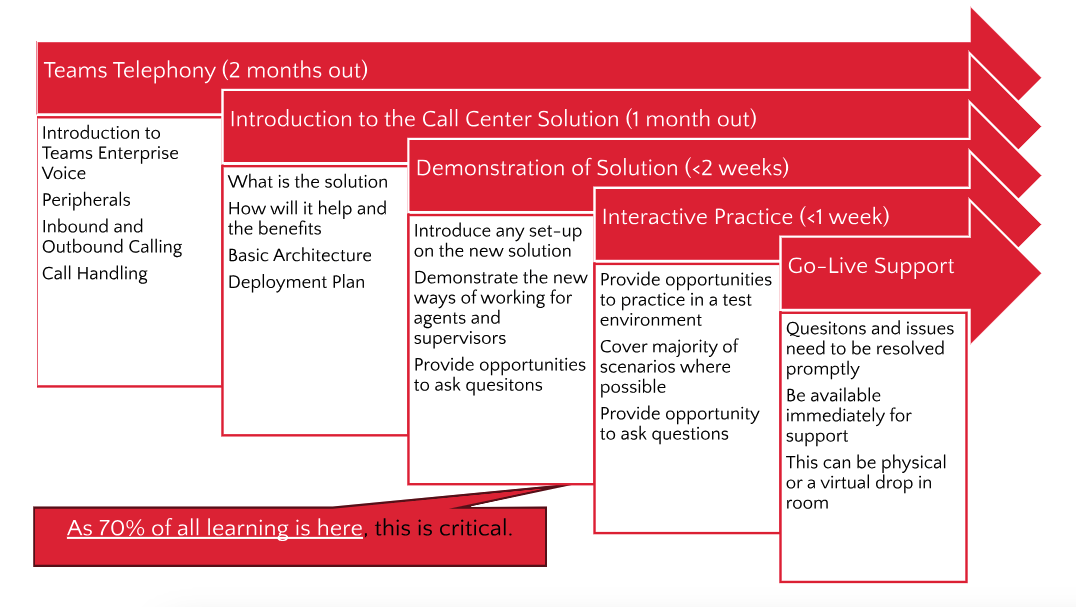Getting your agents ready for your Cloud Contact Centre Launch

Contact centres can perform many tasks of the business, such as customer services, product/technical support, sales, appointment scheduling, payment, or many other use cases.
They all have one thing in common: their performance has a direct impact on the business and as we know with critical systems, there is a natural resistance to changing things that are not broken.
Whilst the change on the technical side is complex and filled with danger, the human aspects are an area that will also need to be fully considered and fully supported.
The human aspect - dealing with supervisor and agent anxiety
As contact centers are quite often critical parts of the business, many metrics are devised to ensure consistent performance. Measures such as connection rates, wait times, first-time resolutions and satisfaction metrics are examples of these. These measures are then woven through the contact centre, with every decision being made viewed through the lens of the impact on results.
This can make the contact centre team even more averse to change. Whilst small changes can be handled within the day-to-day operations, moving the entire communication platform will have an impact. Whilst you as a project team might be confident in the long-term results, the operations teams will often be concerned about the short-term, especially ‘how bad will it be on day 1!’
On top of the metric concerns, they will also have other considerations such as data security and privacy, reliability and downtime, change management and training or just how will this work when I allow agents to work from home?
Making sure that the supervisors are engaged early and supported will determine how successful your project will be. They will have that local knowledge, but they also have apprehensions.
Building knowledge and skills to help support the change
As we know, having the supervisors and managers of the contact centre on board is critical for success to ensure that all requirements and local knowledge are gathered and then implemented.
We also need to provide a clear framework to the supervisors when it comes to communication, support and training for them and their agents. We will need to work hard with them to help minimise the impact of the cut-over. We also need to consider that experience is a key driver of performance as well documented with the blended learning models. So how do we get the agents and supervisors experienced in something that they have never used before?
Assuming the change is significant, we will need to provide a building block approach of knowledge for all levels. There are a couple of reasons for this, the first is to ensure that training does not impact the centre's current performance and the second is ‘just in time’ training, as in Ebbinhaus’ Forgetting Curve.
We also know that during change people want to be communicated early so they can emotionally get themselves ready. So how do we develop our plans with this in mind? Simply put, if they are not going to use that information immediately, park it. So, start with the how and why and move to the details as we get closer.
For a Teams-based system, we could introduce the contact centre solution a month out on a large-scale call, explaining why we are changing and the perceived benefits. You would also clarify the steps of the change. Then moving through the plan, we would demonstrate the solution. If possible, we would want the agents and supervisors to practice in a test environment the week before and of course, have support on the day!
A plan like this for example:

Of course, if you can train Teams Calling in advance then do that too, get your team used to answering calls, transferring calls, etc.
Rolling out in a hybrid environment
So, now we have a plan in place, how do we implement this?
Many organisations have many different contact sites in many different locations. This makes challenges to communicate and train these services more complex. Many organisations also have a hybrid environment now too.
So, you will need to have the ability to train a telephony system remotely which can be riddled with complexity.
Resonate Training Academy
Having people be in a virtual meeting and making calls using the same device creates complexity and few can claim to do with great success.
Our trainers have been training Teams remotely even before the COVID-19 pandemic, and for Luware’s certified Teams Contact Centre solution, they have the experience to be able to demonstrate the end-to-end agent process in a demo environment.
We can also provide an environment for your agents to practice using the system before going live and will customise it to match your system where possible. All of this drives your team’s confidence and reduces change impact.
Bring Resonate on board to help support or implement our plan to help reduce the change impact on the business when changing your contact centre solution. It does not have to be scary!
Find out more about how Resonate can help by visiting our Change and Adoption page.
More like this
 A message from our CEO - 1
A message from our CEO - 1
 Press Release - Resonate is now an SCC business - 2
Press Release - Resonate is now an SCC business - 2
 Resonate is now a Microsoft Solutions Partner for Business Applications - 3
Resonate is now a Microsoft Solutions Partner for Business Applications - 3
